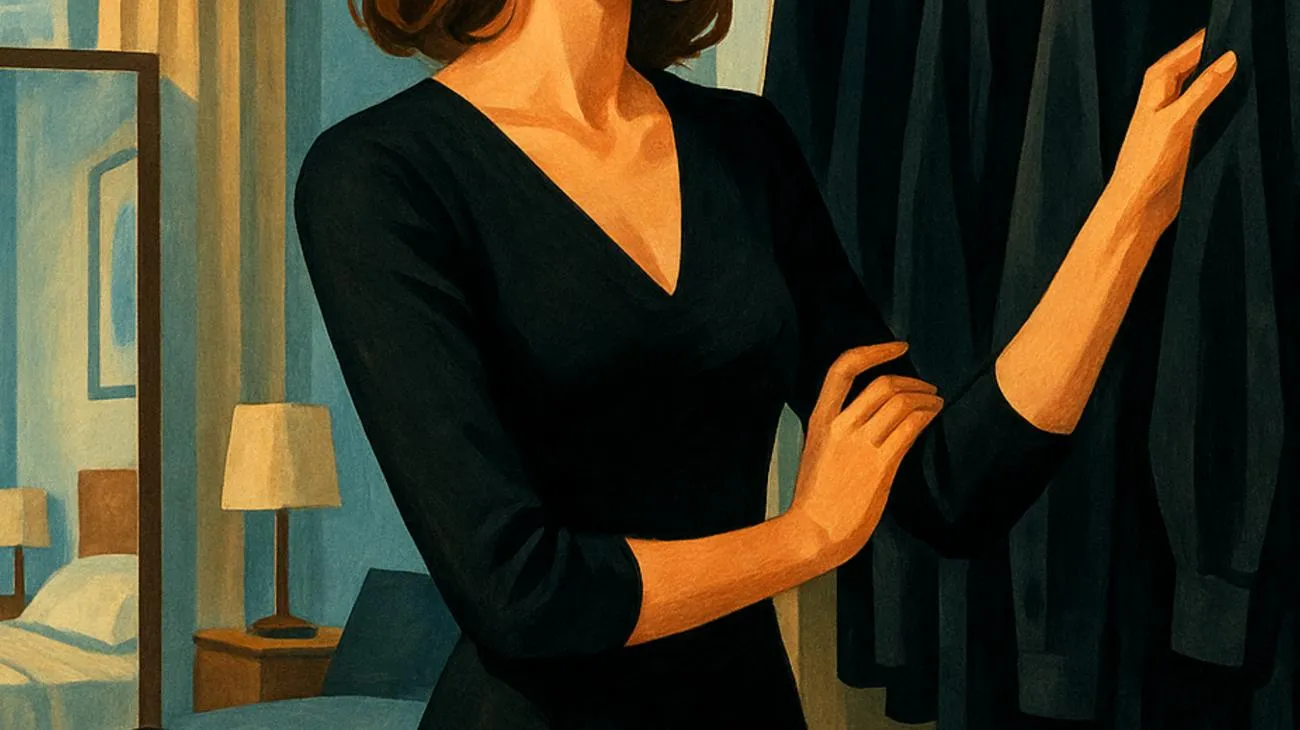Picture this: you’re standing in front of your closet, and once again, your hand gravitates toward that trusty black shirt. Or maybe you’re the type who owns seventeen different black outfits and calls it “having options.” While your friends might joke that you’re channeling your inner goth phase or going for that effortless chic vibe, science suggests there’s actually something way more fascinating happening in your brain when you consistently choose black clothing.
Turns out, your daily uniform might be revealing more about your psychological state than you ever imagined. And no, we’re not talking about some mystical color prophecy – we’re talking about legitimate psychological research that shows the clothing a person chooses can reflect mental and emotional state and broadcasts signals about your personality, emotions, and social goals to everyone around you.
The Authority Card You’re Playing Without Knowing It
Let’s start with the most obvious thing your black wardrobe is doing: making you look like someone who means business. There’s a reason why judges wear black robes, luxury brands favor black packaging, and that intimidating boss who makes everyone nervous probably rocks a black suit. Black clothing automatically triggers associations with power and authority in people’s minds, and this isn’t just some cultural coincidence.
Research from 2012 by Takahashi revealed something pretty mind-blowing about how people perceive black clothing wearers. Unlike people wearing bright colors like red, who come across as optimistic and outgoing, individuals dressed in black were viewed as more socially desirable specifically because they appeared mysterious and enigmatic. Think about it – there’s something inherently intriguing about someone whose visual presentation doesn’t immediately give away their personality.
This mystery factor works like psychological catnip. When you wear black consistently, you’re essentially creating an aura of “I have interesting depths you haven’t discovered yet,” which makes people more curious about who you really are underneath that sleek exterior. It’s like being a walking question mark, but in the most sophisticated way possible.
Your Emotional Armor Has a Color
Here’s where things get really interesting from a psychological standpoint. Many people who gravitate toward black clothing aren’t just making a fashion statement – they’re creating what psychologists call emotional boundaries. Think of black as your personal force field against unwanted social interactions, judgment, or attention when you’re not in the mood to deal with it.
This doesn’t mean you’re antisocial or unfriendly. Instead, black clothing can serve as a psychological tool for managing your social energy. When you’re going through a stressful period, feeling emotionally vulnerable, or simply want to focus on your work without distractions, that black outfit becomes your way of saying “I’m present and professional, but I’m also protected.”
The beauty of this emotional shielding is that it works on multiple levels. Not only does black clothing help you feel more psychologically secure, but it also signals to others that you’re someone who values boundaries and isn’t looking for casual small talk or superficial interactions. In our hyperconnected world where everyone feels entitled to comment on everything, this kind of visual boundary-setting can be incredibly valuable.
The Creativity Connection Nobody Talks About
Plot twist: some of the most creative people you know probably have closets that look like they were designed by someone who thinks color is overrated. But there’s actually solid psychological reasoning behind why creative professionals often gravitate toward black clothing, and it has nothing to do with being brooding artists.
When you eliminate the mental energy spent on coordinating colors, patterns, and complex outfit decisions, you free up cognitive resources for more important creative choices. It’s the same principle behind why some of the world’s most innovative thinkers wear virtually identical outfits every day – they’re channeling their decision-making energy toward the stuff that actually matters to their work and creative expression.
But there’s another layer to this creativity connection that goes deeper than just practical efficiency. Black has been culturally associated with artistic expression and intellectual sophistication for decades. From beatnik culture to modern minimalism, choosing black can be a way of signaling your artistic identity or creative sophistication to the world without having to announce it verbally.
The Aggression Factor That Changes Everything
Now here’s where your black wardrobe might be working a little too well for your own good. A 2013 study published in Studia Psychologica discovered something pretty shocking: people wearing black were perceived as more aggressive than those wearing other colors like gray, regardless of the context or situation. But here’s the kicker – this perception of aggression didn’t make them seem any less respectable or professional.
What this means for you as a daily black-wearer is that you might be unconsciously projecting a “don’t mess with me” energy that could be incredibly useful in professional negotiations or situations where you need to command respect, but it might also be creating unintended distance in personal relationships or casual social settings.
The fascinating thing about this aggression perception is that it doesn’t necessarily reflect your actual personality at all. You could be the most gentle, empathetic person in the world, but that black outfit is sending signals that you may or may not want to be sending. It’s like carrying a psychological “approach with caution” sign that can be both protective and isolating, depending on your goals.
When Black Becomes Your Psychological Strategy
If you’ve found yourself reaching for black clothing consistently, it’s worth taking a moment to reflect on what it’s actually doing for you psychologically. Are you seeking to project authority and command respect in professional settings? Looking for emotional protection during a particularly stressful period? Trying to streamline your daily decisions? Or simply expressing your personal aesthetic preferences?
Understanding these psychological underpinnings gives you more intentional control over your self-presentation. You can consciously choose black when you need to project authority, seek emotional boundaries, or express creative sophistication – and you can choose other colors when you want to send different social signals.
The key insight here is that your clothing choices can become powerful psychological tools when you understand what they’re communicating to both yourself and others. Your black wardrobe isn’t just about looking good – it’s about feeling psychologically equipped to handle whatever your day throws at you.
The Main Psychological Benefits of Wearing Black
- Creates an aura of authority and professional competence
- Provides emotional protection and psychological boundaries
- Eliminates decision fatigue for creative mental energy
- Projects sophistication and intellectual depth
- Maintains mystery and intrigue in social interactions
Whether you realize it or not, your consistent black clothing choice is actively shaping how people interact with you on a daily basis. Colleagues might approach you differently, strangers might make different assumptions, and social situations might unfold in ways that reflect the psychological signals your outfit is broadcasting.
This isn’t necessarily good or bad – it’s just information you can use more strategically. If you’re trying to establish credibility in a new job, your black wardrobe is working in your favor. If you’re hoping to seem more approachable in social settings, you might want to consider mixing in some other colors occasionally.
Potential Drawbacks to Consider
- May create unintended perception of aggression or distance
- Could limit approachability in casual social settings
- Might reinforce emotional withdrawal during difficult periods
- Can become a psychological crutch rather than genuine confidence
Your daily choice to wear black is probably more psychologically sophisticated than you initially thought, and that’s actually pretty impressive. Whether you’re seeking authority, emotional protection, creative expression, or elegant simplicity, you’ve unconsciously chosen a color that delivers on multiple psychological levels.
The research consistently shows that black creates impressions of sophistication, mystery, and authority while potentially providing emotional benefits like protection and simplified decision-making. But remember – you’re not locked into any particular psychological pattern just because you prefer black clothing. You can adapt and adjust based on your current needs and goals.
So the next time someone asks why you always wear black, you can tell them it’s because you understand the psychology of color better than they do. Your black wardrobe isn’t just a fashion choice – it’s a strategic psychological decision that’s working harder for your social and emotional goals than anyone probably realizes. And honestly, in a world full of loud, attention-seeking fashion choices, there’s something genuinely confident about someone who consistently chooses the elegant complexity of black.
Table of Contents

